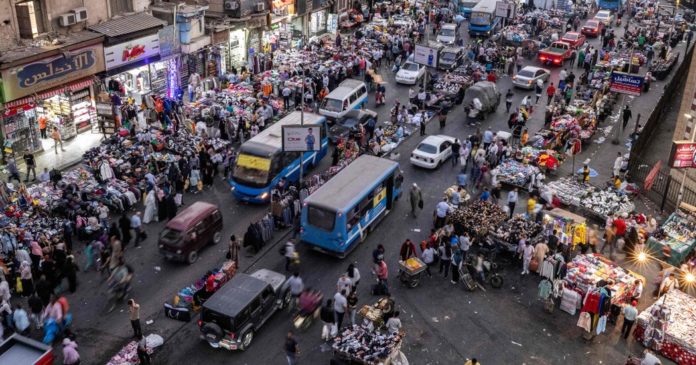CAIRO — The International Monetary Fund announced a $3 billion loan to Egypt on Thursday, the fourth such bailout in six years, in what amounted to more of a Band-Aid than a life raft for a country reeling from the fallout of the war in Ukraine.
The loan, which is expected to be paid out over about four years, could expand by another $1 billion if the fund agrees to dole out additional financing to help Egypt combat climate change. It could also serve as a symbolic vote of confidence, signaling investors who had fled Egypt for safer markets to return.
But economists had said Egypt needed far more money — and deep structural economic changes — to cover its enormous debts and reshape the economy as the value of its pound currency tumbled against the dollar and food and energy prices soared in the wake of Russia’s invasion of Ukraine. After the war and its attendant economic and energy crises began, Egypt’s crucial tourism industry, which relies heavily on Russian and Ukrainian tourists, dried up; its wheat and oil import bills ballooned; and foreign investors fled en masse, taking at least $20 billion with them.
Whatever the long-term outlook, it was clear that Egyptians would feel further pain right away.
Within hours of the announcement, the value of the pound had plunged more than 16 percent to 23 per dollar, a record low. The drop came after the Egyptian authorities announced they would allow the pound to appreciate and depreciate according to market forces as part of the deal with the fund, rather than fixing it at a certain level as they had until recently.
The pound’s slippage since March, when the dollar was worth about 16 pounds, has already badly eroded Egyptians’ purchasing power.
“The rapidly changing global environment and spillovers related to the war in Ukraine are posing significant challenges for countries around the world, including Egypt,” Ivanna Vladkova Hollar, the I.M.F.’s chief representative in Egypt, said in a statement announcing the deal.
She said that allowing the pound to devalue to market rate was “a significant and welcome step.” It is expected to reassure investors that the pound is valued accurately.
The loan, which Egypt had been negotiating since March, still requires final approval from the fund’s executive board. But it was already set to to help catalyze a further $5 billion in financing by next year, the I.M.F. statement said.
Egypt’s foreign backers, led by Gulf Arab countries including Saudi Arabia, the United Arab Emirates and Qatar, have already pledged about $22 billion in investments this year to keep Egypt afloat, fearing instability in the Arab world’s most populous country.
Economists had warned for months that Egypt would need a much larger loan from the fund. But analysts and a banker familiar with the negotiations said the fund had opted for the relatively low amount of $3 billion partly because Egypt had a poor track record of following through on economic reforms it had promised in the past, such as bolstering its private sector, which, apart from oil and gas, has contracted for much of the last six years.
Goldman Sachs said earlier this year that Egypt would need $15 billion over the next three years from the fund.
Egypt has a financing gap of up to $40 billion just this coming year, according to Timothy E. Kaldas, an expert in Egypt’s political economy at the Tahrir Institute for Middle East Policy. The fund’s reluctance to give more, he said, could signal investors to stay away.
Egypt’s economy has been shaky since the 2011 Arab Spring revolution, with plunging tourism and the coronavirus pandemic compounding years of mismanagement. Though the reforms and painful austerity measures that came as a condition of a $12 billion loan from the monetary fund in 2016 were supposed to turn things around, analysts said the authorities never took the steps necessary to strengthen the economy for good.
Instead, they allowed the private sector to shrink while bestowing more projects on the country’s powerful military and intelligence services, which already control much of the economy.
Mr. Kaldas said the Egyptian authorities had devalued the pound to obtain the 2016 loan, plunging millions of citizens deeper into poverty, only to have to come knocking at the fund’s door three more times within six years.
“We’re back to square one, and, if anything, it’s worse than square one,” he said, because Egypt is far more indebted and access to financing is much tighter than in 2016 because of the global economic downturn.
If Egypt does not restrict the military’s role in the economy so the private sector can grow, he added, “this money will get used up very quickly, and we’ll probably be back needing new emergency financing very soon.”
In the throes of the pandemic, Egypt was forced to return to the fund two more times for bailouts worth a total of $7.9 billion, making it its second-largest borrower after Argentina.
By the time Russia invaded Ukraine in February, Egypt was heavily indebted, reliant for foreign cash on investors who poured money into Egyptian bonds because they promised some of the world’s highest interest rates.
That foreign currency went to pay for the imports necessary to feed and clothe Egyptians, while the country exported very little.
Debt also sustained a massive building spree spearheaded by Egypt’s president, Abdel Fattah el-Sisi, who has overseen the construction of a new capital in the desert outside Cairo and other major projects of questionable economic value in recent years.
Mr. el-Sisi has publicly defended his handling of the economy and his megaprojects several times over the last few days, saying poor decisions by Egypt’s previous leaders and the turmoil of the 2011 revolution had exacerbated the country’s challenges. He warned the public on Wednesday that Egypt could not afford good state services and prepared Egyptians for further economic suffering.
“Building the Egyptian state requires sacrifices from all classes of the nation,” he said in a television phone-in on Wednesday.
Developments in the United States, which was also grappling with the shock of the Ukraine war, did not help: American interest rates went up, making American bonds more attractive to investors, while the dollar strengthened, further weakening the Egyptian pound.
Egypt has struggled to pay for basic imports ever since, making many products harder to find on store shelves. Inflation has also hit more than 15 percent, leaving consumers less and less able to afford the items that remained.
A letter of credit system that the central bank imposed on importers, an attempt to conserve dollars, had left everything from cars to chicken feed stuck in Egyptian ports. The central bank said on Thursday that it would do away with the system by year’s end.
“The global economy faced multiple shocks and challenges, the likes of which have not been seen in years,” it said in a statement, noting that Egypt had been hit by the coronavirus pandemic and the conflict in Ukraine.
Under its previous governor, Tarek Amer, the central bank had used its foreign currency reserves to buy the Egyptian pound, creating demand that artificially propped up its value at about 16 to the dollar. But after he was abruptly replaced in August by a new governor, Hassan Abdalla, the bank has allowed the pound to slide more and more, a key condition for the new loan.
Allowing exchange rate flexibility, the bank said in its statement, “will serve as a catalyst for the rejuvenation of economic activity in the medium term.”
The fund will not reveal specific conditions for the loan until it is formally approved. But its statement on Thursday said it had asked mainly for fiscal reforms aimed at reducing Egypt’s debt and strengthening tax collection alongside floating the currency. It also mentioned policies to boost private sector growth by “reducing the state footprint,” without clarifying whether the fund planned to push Egypt to extract its military from the economy.
With global interest rates still high, it remains unclear whether Egypt can attract enough investors even after the new loan, absent profound changes to its economic policies.
The statement also emphasized measures to protect Egyptians, who have already seen their wallets thinned and key subsidies and social programs cut in recent years, from the economic turbulence.
The government raised the minimum wage for public employees to address inflation on Wednesday and recently froze household electricity prices through June.
Source : Nytimes










